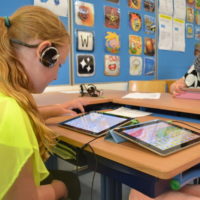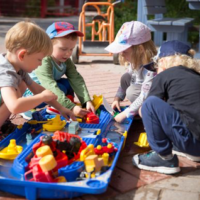Extra Year for Kindergarteners in Victoria
The Australian state of Victoria announced it will expand public kindergarten to include three-year-olds. Previously, the government only provided subsidized funding for four- and five-year-olds. Now, three-year-olds will be offered at least five hours of funded kindergarten per week; this will be gradually scaled up to 15 hours per week by 2029. The initiative is based on research showing that an extra year of early childhood education is associated with improved cognitive and social skills. In order to support this additional year of kindergarten, the Victorian government is recruiting an additional 6,000 early childhood teachers and educators as well as thousands of construction workers to help build new facilities. Read more about the expansion at news.com.au or at the Victoria state government site.

Ontario Increases Supports for Struggling Students, Resumes Standardized Testing

Ontario will increase reading support and expand summer school to address pandemic-related learning loss. The province also plans to resume standardized testing for grades three and six, which had been paused during the pandemic, to help set a baseline for improvement. The government’s new budget adds CAN$174 million (US$136 million) in funding for reading supports and expanding summer programming. New Democratic Party (NDP) Education critic Marit Stiles expressed concern about the additional stress resuming standardized testing will bring for students and suggested the additional funding for support is not sufficient. For more see The Toronto Star.
Netherlands Moves Up Testing Dates to Make University More Accessible to All Students
Dutch students will soon start taking their 8th grade exams in February, before they register for a secondary school in March, in order to give those who may not be at the top of the class a better chance at being placed into a college or university preparatory program. Students in the Netherlands choose a secondary program based on teacher recommendations from among three options — vocational, general academic or pre-university. With the new testing schedule, test scores can be taken into account in addition to teacher recommendations. Dutch officials are also considering broader reforms — like delaying tracking students until the third year of secondary school — as there is concern that the current system gives an unfair advantage to students from more privileged families who are more likely to be placed in pre-university programs. Read more at Dutch News.

Child Care to Become Part of the Education System in Estonia

Aiming to better develop general skills of young children, Estonia is moving oversight of child care for children 18 months to 3 years old to the Ministry of Education and Research and will require that childcare centers serving them adhere to the national preschool curriculum. Triina Raas, the head of the Ministry’s preschool division, said that the goal is to ensure quality programs to support the development of young children. The Ministry will also establish general skill requirements for children ages 3 and older, including playing skills, cognitive and learning skills, self-regulation skills and social skills. Currently general skills are only specified for children ages 6 and 7. For more see ERR News.




